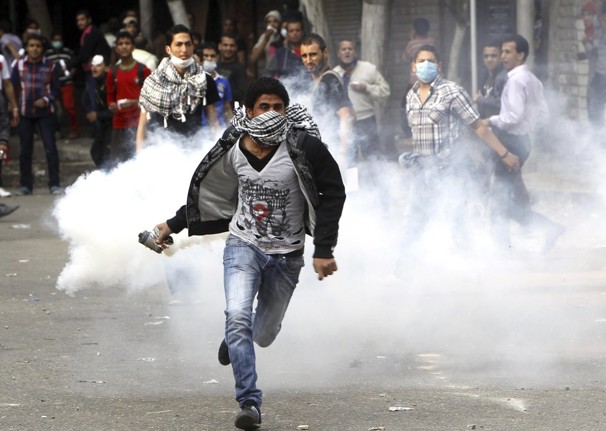Kristin Jankovski is a German journalist who lives in Egypt. She has been closely watching Egyptian since its early beginnings. The interview was published by the Greek leftist newspaper Epohi on February 10
You are 3 years now in Cairo and you have witnessed the revolutionary movement since its beginnings. What is new and what remains the same in the current mobilizations?
Egypt is facing now a new culture of resistance which starts from having an open and free discussion in the street cafes and ending up with burning police cars. Before the 25th of January Revolution most of the Egyptians were scared to talk about politics or they just stayed away from these things. Opposition and anti-government protests got oppressed. The uprising changed a lot in the country. The social networks are a perfect tool to organize demonstrations. Since the 25th of January 2011 people get more and more connected to each other. They share opinions, they argue. They mobilize in facebook-groups, they meet each other at the protests, they are still sharing the same demands. In the beginning of the uprising the Egyptians started to find comrades. A lot of new and small parties were established which are able to mobilize their members. More and more facebook-groups are appearing which are standing for different demands. Most of the demonstrator are not following a political leader or an ideological thinker. Their growing and unstoppable anger is the main engine for the mobilization.
Why so many and so angry people get in to the street? I have read a piece of yours in which your focus was on mass poverty…
Bread, freedom, social justice – these are the demand of the 25th of January Revolution. Till now these demands are not fulfilled. The government seems to be dysfunctional. It is not able to provide the population with basic needs. The economy is in bad conditions. Half of the population is fighting for the daily survival. Life is hard in Egypt. And most of the people are tired and sick of it. The gap between the rich and the poor is immense. Prices are rising. The rule of law and justice seem to not existing in the country. People are disappointed by the government which has done nothing to transform Egypt into a democratic state. Nor it has done anything to fulfill the revolutionary demands. Instead it is oppressing anti-government demonstrations. Activists get kidnapped, tortured, killed. Women get badly harassed and raped at Tahrir square. NGOs and activists are blaming the government for hiring men to attack women. And unemployment and poverty are main reasons why people go down to the streets. They demand a better life in freedom and dignity.
But why so much violence and so many people killed?
Some Egyptians are ready to fight. They don’t fear security forces anymore. The police Is using strong teargas, rubber bullets and even live-ammunition to dissolve the protests. Demonstrators get killed by security forces. The state seems to have no proper solution for solving the domestic problems. So they are repressing and threatening the Egyptians. Since decades most of the population feel offended and they got treated incorrectly by the state. Now they express these emotions in anger and violent behavior. It is a psychological reaction. There are two strong forces standing in front of each other. Firstly the security forces which are defending brutally the current system. And the demonstrators which are fighting against that systems. Both sides want to survive. Both sides are having a life-instinct which made them using violence to defend themselves.
Western media made h huge coverage of the emergence of the Egyptian black block. Is black block so important? Ideologically is ti similar to the European black block?
As we know the western media likes to blow up news. The Egyptian black bloc Is not following a political party, it Is not following an ideological thinker. It appeared at the 25th of January 2013 for the first time. The want to fight against the government with violent actions. They block roads, burn public property, they throw Molotov-cocktails. It has groups in different governorates . Till now the Egyptian black bloc is not having the same importance like the European black bloc. Most of the members of the Egyptian black bloc are young men. The possibility is very high that the black bloc will play a big role in the upcoming protests.
And what about National Salvation Front? Does it really express the spirit of the burning streets?
No, the Salvation Front is too far away from the streets. It main leaders are Mohamed El-Baradei, Hamdeen Sabbahi and Amr Moussa. Old men with gray hair. Nor they are representing the revolutionary youth neither they are able to find a voice for the workers which are suffering the most under the current economical system.
Could-it be any way-out of today’s impasse? A military intervention is-it possible?
There is always a way out. It is the duty of the Egyptian people to work on Egypt’s future. Perspectives for the country’s transformation should find their way into public discussions. The grow of the consciousness has began and it will grow much bigger in the next years. It is the duty of the Egyptians to find a way out. Everything is possible in Egypt. Even a military intervention.
The interview was given to Yannis Almpanis


Πρόσφατα σχόλια